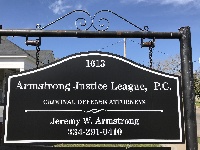Hatchechubbee Misdemeanor Lawyer, Alabama
Not enough matches for Hatchechubbee Misdemeanor lawyer.
Below are all Hatchechubbee Criminal lawyers.
Jeremy W. Armstrong
✓ VERIFIEDCriminal, Felony, Misdemeanor, DUI-DWI, State Appellate Practice
"A Criminal & D.U.I. Defense Law Firm"
I have spent my entire legal career in the criminal justice system as a former prosecutor and a criminal defense attorney since October 2000. In Apri... (more)
Connie Jo Cooper
Wills & Probate, Divorce & Family Law, Criminal, Medical Malpractice
Status: In Good Standing Licensed: 32 Years
FREE CONSULTATION
CONTACTJames Robert Mckoon
Divorce & Family Law, Criminal, Personal Injury, Accident & Injury
Status: In Good Standing Licensed: 47 Years
Ralph Michael Raiford
Accident & Injury, Criminal, Estate, Traffic
Status: In Good Standing Licensed: 46 Years
Ray Winston Daniel
Federal Trial Practice, Government, Criminal
Status: In Good Standing Licensed: 24 Years
Roger W. Pierce
Business, Bankruptcy & Debt, Criminal, Divorce & Family Law, Accident & Injury
Status: In Good Standing
Sara Gottlieb Bragdon
Lawsuit & Dispute, Divorce & Family Law, Criminal
Status: In Good Standing Licensed: 12 Years
James Eugene Williams
Child Custody, Criminal, Business Organization, Administrative Law
Status: In Good Standing
Mark Francis Penaskovic
Car Accident, Litigation, DUI-DWI, Employment Discrimination
Status: In Good Standing


